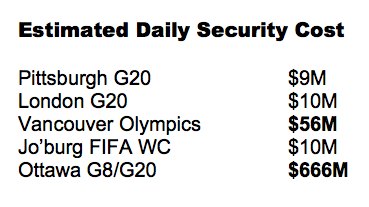Remember the successive scandals about $640 toilet seats, $7,600 coffee pots and $436 hammers made for the U.S. armed forces?
The simple explanation is usually the right one, so the smart money’s always been on the bet that by over-budgeting for tens of thousands for simple items like these, the U.S. armed forces padded their top-secret budgets, creating fiscal space that could be inhabited by expensive “black projects,” “special weapons skunkworks” and the like.
Now, about that $5.5-million fence in Toronto. … You know, the one that shuts 5.5 million Torontonians out of their own city. The one that’s only six kilometres long.
Seriously, do you really believe it cost the taxpayers of Canada $5.5 million for six kilometres of chain link fence? If that were true, maybe $2 billion for security at the prime minister’s G8/G20 bunfest — including the cost of fake Lake Stephen Harper — might actually make some sense. But then again, maybe not…
But do you believe that Harper’s Conservatives actually managed to spend $2 billion to buy three days of security? If you do, there are nice bridges all over this country that aren’t yet owned by P3s in which you may want to invest.
Even the odious National Post, which loves all things Harperite, doesn’t believe the government on this one, pointing out that the security bill for the G20 gabfest in Pittsburgh last fall was a modest $18 million, while security for a similar G20 gathering in London last spring only ran up a $20 million tab. Even a steady flow of pork for Industry Minister Tony Clement‘s Parry Sound-Muskoka riding hardly explains the difference.
Just to keep things current, consider this comparison: Security for the FIFA World Cup in South Africa is reported to have an estimated $313 million US price tag. That involves the use of 44,000 paramilitary police — more than double the size of the entire regular membership of that other well-known paramilitary organization, the Royal Canadian Mounted Police. Plus, it includes armed escorts for all soccer players.
And remember, the FIFA world cup runs for a month, from June 11 to July 11. Harper’s G8/G20 beanfest, by comparison, runs for three days, generously interpreted.
Oh yeah, and the FIFA World Cup is taking place in Johannesburg, one of the most dangerous cities on earth, whereas the G8/G20 extravaganza is taking place in … uh … Toronto. Or have the citizens of Toronto the Good turned into rampaging mobs of rabid soccer hooligans without the rest of us Canadians noticing?
Now, since the U.S. and Canadian dollars are roughly at par, let’s round the cost of a month of World Cup security off to $320 million Canadian, which is, as they used to say, “close enough for government work.”
So, just on the face of it, it’s costing well over six times as much for Canadian officials to provide security for a much smaller, shorter and tactically easier-to-secure event. (If you know anything about security matters, you’ll know that a chain link fence doesn’t buy much real security from determined foes with firearms, mortar bombs and the like. It does, however, keep protesters out of range of the TV cameras, which one suspects is the true objective in the Canadian case.)
Even when you consider the total cost of the World Cup, estimated at $3.7 billion to $5 billion, it sounds like a much better deal than Harper’s weenie roast for the international predator class. At least there are some tourist spin-offs, and a boost for the world vuvuzela trade.
Regardless of that, when the time factor is considered, the security cost comparison numbers are actually much worse. The South Africans are providing security at a cost of a little more than $10 million a day — or more than 66 times cheaper than the Canadian daily cost.
Maybe one question we Canadian taxpayers should be asking is, Are the South African intelligence and security services really that much more efficient than their Canadian counterparts? (If they are, perhaps we should be outsourcing this function! There are lots of options for this, as both the British and U.S. daily security costs in London and Pittsburgh were very comparable.)
But the real question we should ask, of course, is this: When Harper’s Conservatives are done paying the true cost of summit security, what do they plan to do with the rest of the money?
This post also appears on David Climenhaga’s blog, Alberta Diary.



